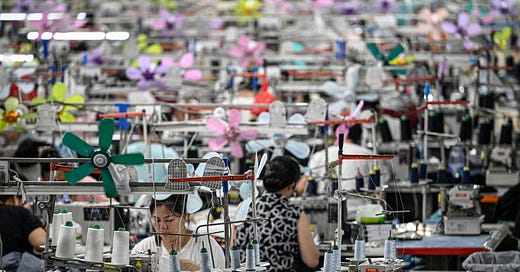
It’s hard to miss ads for Shein, Temu, and Wish if you spend any time on the subway or watching live sports on TV. These days you can’t even scroll through your TikTok and Instagram feeds without being served ads from these lowbrow Chinese e-commerce sites touting everything from $2 Apple AirPods knockoffs to shower curtains featuring a smiling Nicolas Cage side by side with Harambe. There’s an entire genre of influencers whose content revolves solely around “haul culture,” as they rip open piles of new clothes from plastic Shein bags and unbox an endless variety of plastic widgets from Temu’s bright orange packaging.
This digital retail revolution, allowing you to purchase an entire outfit for the same price as a Starbucks latte, is about to get disrupted thanks to the Trump administration. The president’s new executive order announcing tariffs against China, Canada, and Mexico also includes language about closing the so-called “de minimis loophole.”
This long-held tariff exemption allows goods to be shipped directly from overseas to American consumers, without any customs declaration, so long as the value of each package is under $800.
The de minimis provision has existed since the 1930s, long before the internet and the existence of e-commerce retailers. The term has roots in ancient Roman law, derived from the legal concept de minimis non curat lex, meaning that a law does not concern itself with trifling things. It was meant to apply to items like souvenirs from Paris or bottles of perfume from Algiers, which travelers did not have to declare to customs officials, just to avoid administrative inconvenience.
Over time, the prices of goods kept rising and so did the de minimis threshold. In 2016, Congress voted to increase the value under which consumers didn’t have to declare anything from $200 to $800. Since then, the meteoric rise of Chinese e-commerce giants like Shein and Temu that specialized in cheap goods eclipsed the rest of the online retail market.
In 2024, American consumers received 1.4 billion packages under the de minimis loophole. Shein has been able to leverage lower labor and factory costs to bring you $5 sundresses, though there are allegations that the company uses cotton suppliers from Xinjiang that flout the Uyghur Forced Labor Protection Act. (The company denies the charge.)
Meanwhile, Temu’s innovative gamification of online shopping relies on an “on demand” business model and a “just-in-time” inventory management system: Sellers ship products to Temu’s warehouse only after an order is placed, minimizing storage costs. Both of these platforms massively benefit from not having to pay any import duties and/or file customs declarations.
To put things in context, clothing retailer Gap paid $700 million while H&M paid $200 million in import taxes in 2022 alone. Temu and Shein are not only exempt from tariffs and other taxes; they are also exempt from government rules covering product safety, forced labor dictates, and so on, that Gap and H&M have to comply with. It’s much easier for Customs and Border Protection (CBP) officials to inspect a shipping container that is filled with goods that are vouched for with proper documentation than it is to inspect the more than one million packages coming in per day from Temu and Shein. What’s more, many things end up slipping through the cracks—unsafe items, knockoffs, products made with forced labor from Xinjiang, and yes, chemical precursors that are used to make fentanyl.
Even the most strident free trade evangelists must at least acknowledge that the de minimis loophole has handed China’s e-commerce companies an unfair trade advantage, allowing it to undercut other retailers and avoid customs inspections and other regulations. While the exact nature of the changes to the de minimis loophole is still unfolding, forcing Temu and Shein to disclose the contents of every package and pay applicable tariffs will result in a lower volume of packages coming into the United States. These companies had begun preparing for this change in party by putting warehouses just across the border in Tijuana and Toronto. Oops! Trump’s 25 percent tariffs on both countries has shut off that loophole too.
Chinese e-commerce companies will still be able to produce cheaper goods very quickly. Consumers will still be able to purchase inflatable nightclubs and receive dresses that bear no resemblance whatsoever to what was pictured online. The popular and strangely self-aware Temu memes that poke fun at its own shoddy quality will still be around. But no longer will Chinese e-commerce retailers compete with an unfair advantage. It’s a sign that the United States is no longer emphasizing free trade—trade without restrictions—but ensuring that trade is fair for all parties. It’s about time.
Melissa Chen is the managing director of Strategy Risks, a business intelligence firm that specializes in analyzing risk from China. You can find her on X at @MsMelChen.













